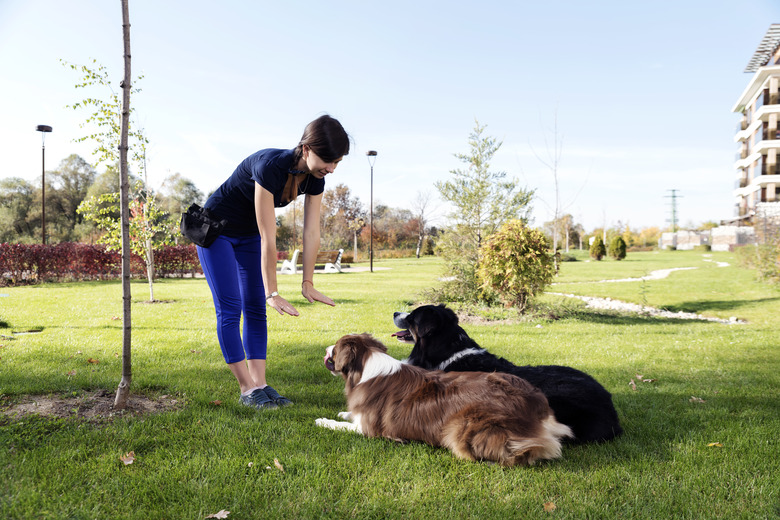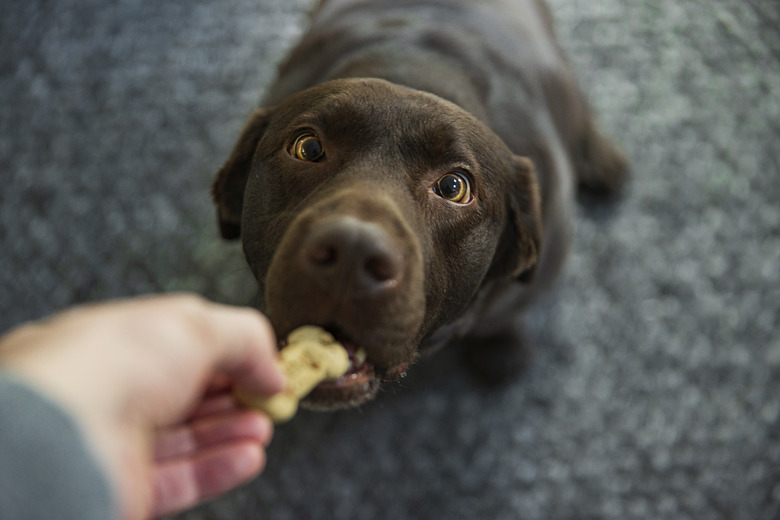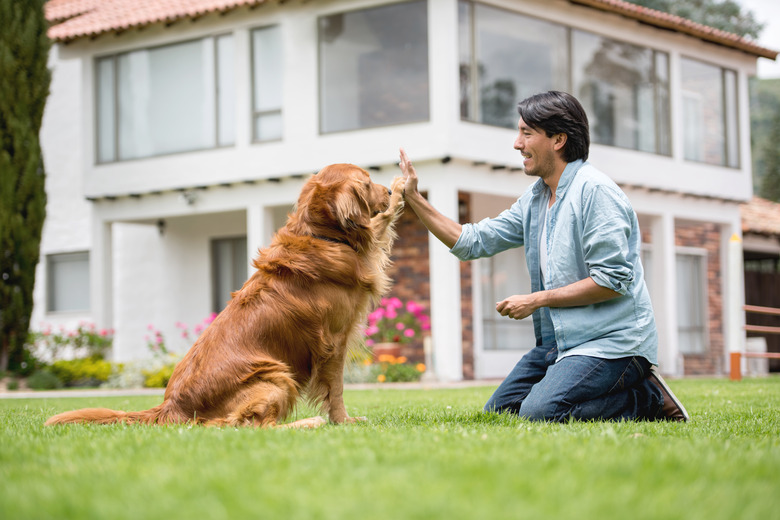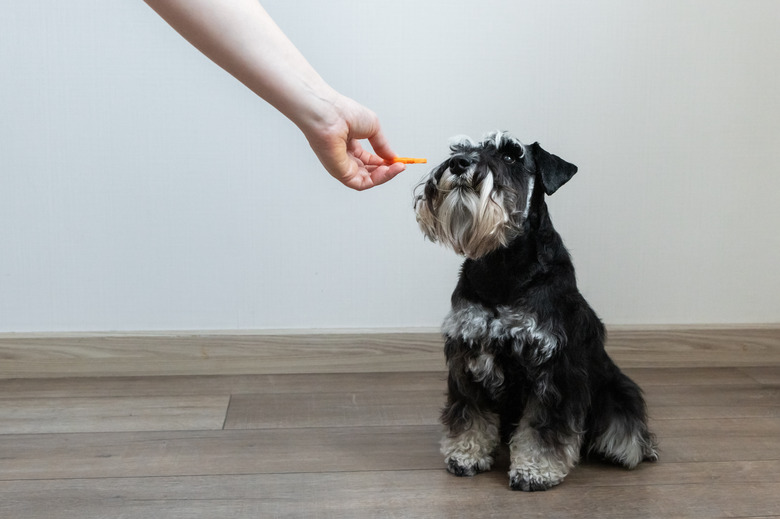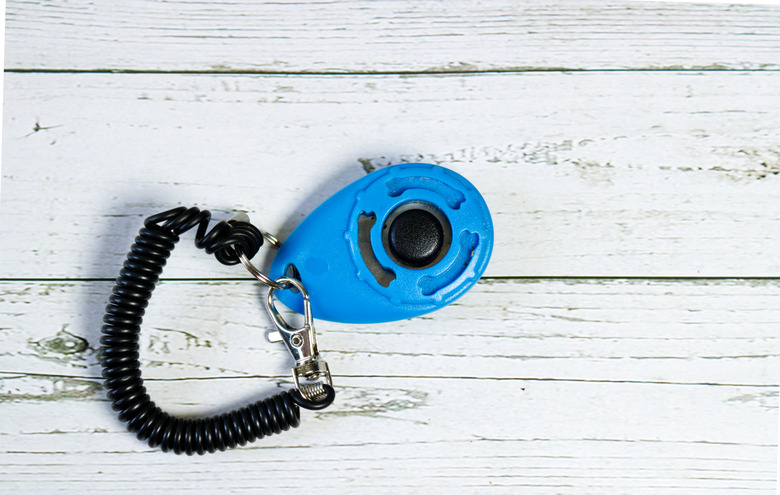Looking For A Dog Trainer? Watch For These Red Flags (And These Green Flags Too!)
How do you find a qualified dog trainer? All dogs benefit from training, but choosing a dog trainer can feel overwhelming. Because dog training is an unregulated industry, it can be very difficult for loving dog guardians to find the right trainer to hire.
Crucially, any dog trainer you hire should be utilizing positive reinforcement methods. The American Veterinary Society of Animal Behavior and other veterinary and training organizations have released clear position statements that utilizing aversive tools or techniques that rely on intimidation, discomfort, or pain are not humane or effective ways to train dogs. Unfortunately, popular trainers on TV and social media frequently utilize these methods, making it even more difficult for dog guardians to discern between good and bad training.
If you're looking for a dog trainer, here are red and green flags to keep an eye out for!
Red flags in dog trainers
Red flags in dog trainers
Trainers who do or say these things are likely trainers who are using aversive methods, which are outdated and harmful. The American Veterinary Society of Animal Behavior and other organizations have taken clear position statements that utilizing aversive tools or techniques that rely on intimidation, discomfort, or pain are not humane or effective ways to train dogs.
- Promise they can fix a behavior issue- Dogs are unique individuals, and behavioral
issues have a variety of causes including individual personality and
temperament, genetics, environment, socialization, and overall history.
There are never any guarantees when it comes to dog training. A successful
training outcome is going to look different depending on each individual dog
and what issues they are working through, the skill and commitment of the
dog's guardian to implement training plans, and a variety of other environmental
and behavioral considerations unique to your dog.
- Says certain breeds need a "firmer hand" (or similar language) -While individual dog breeds have specific needs, no breed needs to be trained harshly or with aversive
methods. All dogs. regardless of size and strength, can and should be trained utilizing positive reinforcement training
methodologies. Positive reinforcement training is proven to work on much larger and stronger animals, and is frequently used in zoos. Any trainer suggesting that some breeds of dogs require
aversive training are misinformed, and are not someone you want to hire.
- Use outdated phrases or concepts - If a trainer utilizes words like
"balanced" "alpha" or "dominance," that is a sign they are utilizing
aversive training and not someone you want to train with. Similarly, if a
trainer talks about how they use all four quadrants in their training, that's
someone you want to stay away from. Dogs don't learn better that way. In
fact, training dogs with punishment can lead to dogs shutting down, or even
increase unwanted behaviors. Some trainers will also use the term "correction" (as in "issue a correction" for unwanted behavior) — this is just a euphemism for punishment.
- Secretive about their approach- Good trainers are forthcoming and transparent
about their training approaches. If a trainer is unwilling or unable to
describe exactly how they will work with your dog, that is a red flag. Dog
trainers should be up front and clear with their training methodologies before you begin training together.
- Runs a bootcamp-style training program -With this style of training, the dog is
sent away for the trainer to work with. Not only does this not teach you
how to work with your dog, but it also means you can't directly supervise
how your dog is being handled, opening up the risk of mistreatment or
abuse. Although some trainers who utilize positive reinforcement training
techniques will run "board and train" programs, board and train/bootcamp
is most common amongst aversive "balanced" trainers.
- Uses physical punishment or painful tools - Leash pops, alpha rolls, knees, punches, pushes
or the use of prong collars or e-collars are all abusive, and big red flags
that a trainer is not someone you want to allow anywhere near your dog.
Hurting, intimidating, or otherwise harming a dog in the name of training
isn't acceptable. If a trainer is physically correcting or punishing a dog they are training, run the other way.
Green flags in dog trainers
Green flags in dog trainers
Now that we've covered the things you want to make sure to avoid, here are some signs to look for that a trainer is skilled, following the current trends in humane and ethical dog training, and so may be qualified to work with you and your dog.
- Continuing to pursue professional development - Dog trainers should always be
learning and gaining new skills. Not only is it helpful for staying up to
date, ongoing professional development is required to achieve and maintain
training credentials.
- Has certifications - There are excellent trainers who are very experienced but do not have
certifications (this is often especially true in specialized sports
training). However, certifications are a sign that a dog trainer has proven
their knowledge and skills when it comes to working with dogs. Although
certifications are not a guarantee, that a trainer will be a good match if
those certifications are through reputable organizations like the Certification Council for Professional Dog Trainers you can be assured
a trainer has committed to using LIMA (Least Invasive, Minimally Aversive) training
principles.
- Encourages questions - A good trainer is open and excited to
answer your questions. Good trainers want to make sure that you are understanding
what they are teaching. This means they are not only happy to answer
questions, but also will explain training plans in different ways to ensure
you're understanding.
- Gets creative – You want to
work with a dog trainer who is going to get creative to help you better
understand your dog and make sure their needs are being met. Dog training
is dynamic, and every dog, family, and household is different. A good
trainer will take that into account to help create an individualized
training plan to help you work with and support your dog and not expect
dogs and people to fit into a one-size-fits-all training plan.
- Clear about their areas of specialty – Some dog trainers specialize in specific training areas. This might look like a specific
sport, separation anxiety, or general obedience skill. A
green flag is a trainer being clear about what kind of training they do and don't do, and not being afraid to refer out clients who want to focus on training outside of their
expertise.
- Patient with your dog - It's natural to want dog training to
move quickly so you can work through any issues you're struggling with. However, it's important that trainers are transparent that there are no quick fixes
when it comes to training. You want a trainer who is going to be patient,
and who is committed to working at your dog's pace, paying special
attention to stress signals and body language. A
good trainer will make sure your dog is comfortable with all aspects of training.
Questions to ask a prospective trainer
Questions to ask a prospective trainer
If you're looking for a new dog trainer to help you work with your dog or puppy it's important to shop around to find the right trainer for you and your dog. Any good dog trainer should be more than happy to answer all questions you have about their experience, background, education, and training approaches. If you're interviewing a prospective dog trainer
- What experience do you have with dog training? A trainer should be able to
confidently explain to you what experience they have working with dogs.
This can include their educational experience, apprenticing under other
trainers, as well as training and competition they may do in dog sports
and activities with their own dogs.
- What credentials do you have? Dog training is an unregulated industry,
and trainers don't necessarily need credentials to be a dog trainer. However,
any dog trainer should be able to explain what their education is, who
they have apprenticed under and/or what credentials they have obtained,
and what they are working on obtaining.
- What happens if my dog does something "wrong" in a training session? Knowing how a
trainer will behave can help you determine if you're comfortable working
with them. This will help you to understand what (if any) kind of punishment
this trainer believes is acceptable, and how they approach a situation
where a dog isn't understanding the training session.
- Can you provide me with references? Any dog trainer should be able to provide you
with references for training clients they have worked with in the past.
Many trainers will also have testimonials on their website that can be
read to get an idea of what working with this trainer is like.
Do additional research
Do additional research
Dog trainers can have slick marketing. but that doesn't necessarily mean they are qualified, experienced, or ethical when working with dogs. In addition to asking questions and ideally checking references, it's helpful to also spend some time observing a a trainer's website and social media profiles. Spend some time looking at their posts. Look to see how they handle the dogs they are working with, and if their approach is something you feel comfortable with. This is also a good way to watch and make sure that the trainer you are looking to hire isn't utilizing aversive tools, like shock collars and prong collars.
What to do if you're overwhelmed
What to do if you're overwhelmed
All of this information can be a lot to take in! If you feel overwhelmed, you can always fall back on asking two questions of your prospective dog trainer: "what happens when my dog gets it right? What happens when my dog gets it wrong?" A good trainer should be reinforcing desired behaviors, and not punishing any other behaviors.
Happy training!
